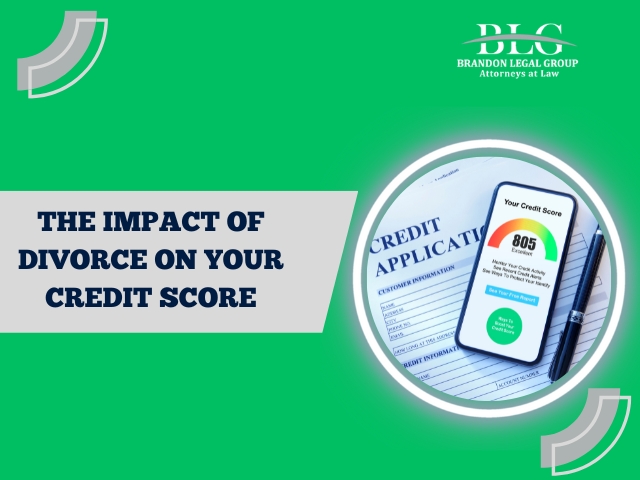Divorce is a tumultuous life event that can affect various aspects of your life, including your credit score. While divorce doesn’t directly impact your credit score, the financial decisions and responsibilities arising from the separation may have substantial effects. Understanding these potential changes and how to navigate them with the assistance of an attorney is vital.
Understanding Credit Score Basics
Before diving into the divorce’s impact, it’s essential to understand what a credit score is and how it’s calculated. Your credit score reflects your creditworthiness based on your credit history, debts, payment history, length of credit history, types of credit, and new credit. Changes in these factors due to divorce can affect your score.
In many cases, it’s the gateway to securing basic needs and fundamental stability in life. Good credit isn’t just a financial luxury; it’s often necessary today. A favorable credit score can decide whether you can rent a home, finance a car, obtain a credit card, get lower utility deposits or even purchase essential household items on credit. Furniture and electronics retailers often offer financing options, and a good credit score can mean lower interest rates or more generous repayment terms. Conversely, poor credit can close doors and create barriers, leaving individuals needing help to access essential resources. The difference between a good and bad credit score can make or break opportunities, shaping the quality of life and financial freedom. It’s not merely a number; it’s a critical component of personal empowerment and economic well-being. A strong credit score can make securing a mortgage or renting an apartment more accessible, often at more favorable terms.
Whether starting a new chapter after a significant event like a divorce or simply managing daily living expenses, maintaining good credit is essential in financial planning and independence. It can ease the way in many aspects of everyday life, providing greater flexibility, lowering costs, and enhancing your ability to rebuild your life after your divorce.
Joint Accounts and Divorce
Couples often hold joint accounts in the names of both spouses, such as credit cards or loans, during a marriage. They can include bank accounts, credit cards, mortgages, car loans, or other forms of debt. When couples divorce, these joint accounts must be addressed and often separated. The divorce process requires a clear division of these financial responsibilities. Joint accounts are a common financial element in marriages and can become a complex issue during a divorce. Here’s an expanded look at how joint accounts and divorce interact:
Division of Joint Debts
Dividing joint debts is a complex and critical aspect of the divorce process. Both spouses are typically responsible for the debts incurred during the marriage, but the division of these responsibilities can vary based on state laws and individual circumstances. Different states have changed rules concerning property division in divorce. Consult a divorce attorney who can provide essential guidance and advice tailored to your jurisdiction’s regulations and requirements.
- Community Property States: Most debts incurred during the marriage are jointly owned in these states, and each spouse is equally responsible for paying them off.
- Equitable Distribution States: In these states, the courts consider various factors to determine a fair division of debts, such as each spouse’s income, earning potential, and the circumstances under which the debts were incurred.
The Importance of Legal Agreements
A divorce decree may clearly outline who is responsible for each joint debt, but these agreements do not bind creditors. The other spouse’s credit score may be affected if the spouse is responsible for a joint debt and does not pay as agreed. A divorce attorney can assist by:
- –Drafting clear agreements regarding the division of debts
- Negotiating with creditors to remove one spouse’s name from joint accounts
- –Advising on refinancing options to separate joint liabilities
The following is a DRAMATIZATION AND NOT AN ACTUAL EVENT: Susan and Steve had several joint credit card accounts. Their divorce decree stated that each spouse would be responsible for half the credit card debt. Susan paid her portion, but Steve did not pay his portion. The credit card company continued to view the debt as joint and reported the missed payments, negatively affecting Susan’s credit score.
Considerations for Joint Assets
Joint assets, such as a shared home or vehicle, must also be considered. Decisions must be made regarding selling, refinancing, or transferring ownership, and each option can have different implications for both parties’ credit scores.
Joint accounts add complexity to divorce proceedings and may have lasting impacts on both parties’ financial futures. The guidance of a divorce attorney is invaluable in navigating these challenges by carefully addressing joint accounts, debts, and assets. By understanding divorce’s legal and financial implications, couples can work towards a fair division of financial responsibilities and minimize the impact on their credit scores.
The following is a DRAMATIZATION AND NOT AN ACTUAL EVENT: Jane and John had joint mortgage and credit card accounts. John was responsible for the mortgage during their divorce, and Jane was responsible for the credit cards. John failed to make timely mortgage payments, while Jane closed the credit card accounts. Both actions negatively impacted their credit scores. Consulting a divorce attorney would have advised Jane and John to separate their joint accounts as soon as possible, ensuring that each party’s financial responsibilities were clearly defined and legally binding.
Impact on Debt Responsibility
Divorce settlements often include agreements on who is responsible for paying specific debts. However, lenders may still consider both parties liable for joint debts, regardless of the divorce decree.
The following is a DRAMATIZATION AND NOT AN ACTUAL EVENT: Sarah and Sam’s divorce decree stated that Sam was responsible for their joint car loan. However, Sam failed to make the payments, negatively affecting their credit scores. An attorney can help in these situations by providing legal resources to ensure that both parties adhere to their responsibilities and assist in renegotiating terms with lenders if necessary.
Factors Influencing Debt Division
- Community Property vs. Equitable Distribution: Laws on debt division during divorce vary by jurisdiction. In community property states, marital debts are typically divided equally. In equitable distribution states, debts are divided in a manner deemed fair but not necessarily equal. For example, in Florida, debt and assets in a divorce are divided equitably and fairly, not always a 50/50 split, and dependent on other factors.
- Prenuptial or Postnuptial Agreements: These agreements can predetermine the division of debts and assets and may override state laws.
- Individual Circumstances: Courts often consider various factors, such as earning capacity, the needs of children, and the contributions of each party to the marriage, when dividing debts.
Divorce Expenses and Credit
Divorce can be expensive, leading to financial strain that may affect your credit. Dealing with expenses due to divorce requires careful planning, understanding, and, often, professional guidance. Creating a clear budget for legal fees, potential support payments, and the division of joint assets and liabilities. Identifying and prioritizing necessary expenses helps in allocating resources effectively. Communication with your ex-spouse may also be crucial in resolving shared financial responsibilities.
Working closely with a divorce attorney can also offer insights into your legal obligations and rights, helping you navigate divorce’s often complex financial landscape. Professionals such as financial planners and accountants may also be beneficial, providing strategies to manage new financial realities and potential tax implications. By approaching the financial aspects of divorce systematically and seeking professional advice when needed, you can mitigate financial stress and set the stage for future financial stability.
The following is a DRAMATIZATION AND NOT AN ACTUAL EVENT: Overwhelmed by legal fees during his divorce, Tom began using his credit cards to cover daily expenses. As his balances grew, his credit score plummeted. An attorney may help by providing financial resources, such as recommending a financial planner or advising on budgeting during a divorce to avoid excessive debt accumulation.
Impact on Home Ownership
Divorce often includes discussions about home ownership, mortgages, and potential refinancing, which can impact your credit score.
The following is a DRAMATIZATION AND NOT AN ACTUAL EVENT: Emily and Eric decided to sell their home during the divorce. However, sales delays led to missed mortgage payments, impacting their credit scores. In these situations, seek an attorney to obtain advice on legal options and timelines and facilitate communication between parties to minimize credit score damage
Protecting Your Credit Score During Divorce
- Monitor Your Credit: Regularly check your credit report for discrepancies or unauthorized activities.
- Separate Joint Accounts: Work with your attorney to separate joint accounts and define responsibilities.
- Create a Budget: Plan your finances to avoid excessive debts.
- Work with Professionals: Attorneys and financial planners can guide you through the legal and financial complexities.
Conclusion
Divorce introduces multiple financial challenges that may affect your credit score. By understanding these potential impacts and working closely with an experienced divorce attorney, you can navigate the process with greater confidence and minimal damage to your financial future. An attorney provides legal expertise and acts as a resource, advising on financial management, offering support, and helping you make informed decisions to protect your credit during this challenging life transition.
